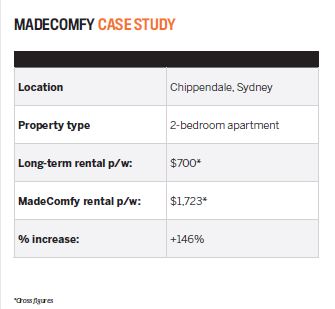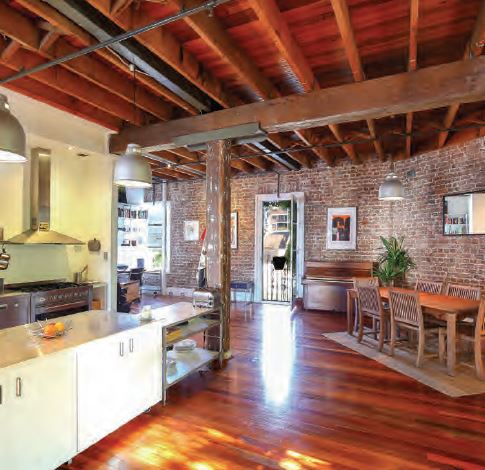Like many top-notch ideas, the MadeComfy concept was conceived when co-founder Quirin Schwaighofer spotted a niche in the market as a result of his own experience.
It was back in 2014 when he was travelling overseas. He had rented out his apartment in Sydney’s Cremorne Point on Airbnb, and realised that in order to maximise his returns and deliver his guests a five-star experience, he needed local support to manage his bookings.
It was upon Schwaighofer’s return that he partnered with co-founder Sabrina Bethunin to create MadeComfy, a property management business designed to help landlords leverage the opportunity to profit from holidaymakers.
“We’ve been operating for two and a half years now in the shorter-rental space, and we are still working with the owners that started with us very early on, because we’ve been able to overdeliver on our forecasts and exceed their expectations,” he says.
“Quite a few of our property owners have been acquiring additional properties in that time, simply because, from a cash fl ow POV, they are able to do that. And we’ve been helping them to identify the properties that are suitable for short-term renting.”

“It is becoming more difficult to find long-term tenants who are able to pay the required rent to cover the mortgage payments, and the increase in the supply of apartments doesn’t help. In Melbourne especially, there’ve been a lot of high-rise buildings being built over the last couple of years, or that are coming up,” he says.
“That’s where we come in with our model, to provide an alternative to the conventional rental concept. We help landlords achieve a higher return … and also, you won’t have a month where you have no one in there, where you can’t find a tenant. With our Airbnb strategy, you might have one or two days in between bookings, but you won’t have your apartment empty for a month.”
So, how does Schwaighofer generate such high returns for his clients?

“You need to understand the location and the type of property suitable for short term. At the same time, in some buildings you don’t get a good long-term rent. The properties are all identical, and it’s difficult to differentiate – you don’t have views, you don’t have a carpark, you don’t have a balcony,” he says.
“These are things that maybe a long-term tenant wants to have, but for short-term tenants it doesn’t matter – they don’t need a car park; they don’t need a view. They want to stay somewhere that’s nice, warm and homely, and cheaper than a hotel.”
For landlords who are keen to leverage a short-term letting strategy, Schwaighofer says once you are clear that your property does suit the holidaymakers rental market, you need to optimise its potential. This could include a quick spruce-up with paint, newer furniture, or perhaps additional amenities such as ceiling fans or heating.
When your rental is up and running and attracting regular tenants, maintaining it to a high standard is also crucial.
“It is important that you manage your property well. That means you need to have someone look after it – to be in there regularly to do inspections, to check the guests and to clean it after every booking. At MadeComfy we also make it a point to act on maintenance straight away, so the condition of the property is maintained and guests end up leaving great reviews. Furthermore, our hosts can rest assured that they are complying with the rules and regulations of short-term letting, aligning with building communities and neighbours,” Schwaighofer says.
This hands-on strategy has meant MadeComfy can help its clients enjoy stronger returns than the average Airbnb host, he adds.
“It’s one thing to follow Airbnb’s pricing strategy, but what we’ve seen is that you can achieve 40% or more than Airbnb is recommending,” he says.
“One thing we do to help achieve this is to set prices every night to maximise the return. We have a data analytics team here that collects data on traveller requests and available properties, so we compare demand and supply. Then we predict how likely it is for a property to get a booking at price X. That enables us to achieve higher nightly rates and higher occupancy rates than others, because our rates are created by algorithms, and machine learning will always be better than rates set by just humans.”
He adds: “Airbnb is a market designed for amateurs, but with more and more listings coming up – Melbourne has around 16,000 listings, around double last year’s – you have to be smarter than others.”
Get your free short-term rental forecast from MadeComfy.
Ph. 1800 526 133 30
.JPG)